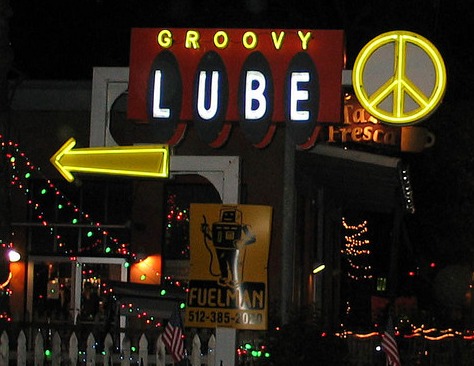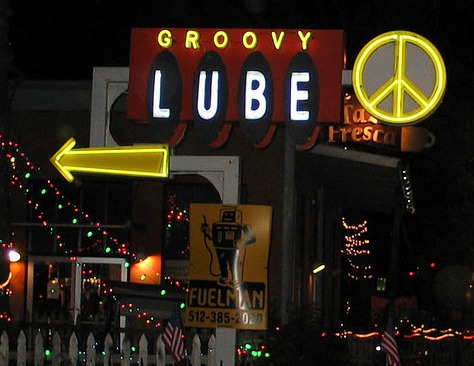Send your question to Umbra!
Q. Dear Umbra,
Sooo….. I noticed in your column today that parabens should be avoided to keep breasts healthy. I also noticed parabens are an ingredient in KY personal lubricant! So I tossed mine, headed on down to the drugstore, and checked out the personal lubricant section. None that I found were paraben-free. Suggestions?
Sarah
British Columbia, Canada
 Lube should be groovy. So keep those funky parabens away!Photo: txkimmersA. Dearest Sarah,
Lube should be groovy. So keep those funky parabens away!Photo: txkimmersA. Dearest Sarah,
Thank you for reading and taking care of your breast friends. No doubt you are referring to the warning, “Beware of parabens!” in my column on environmental links to cancer.
Your conscientious personal lubricant consumption is inspiring and important for more reasons than you may know. Why dare to beware? Let’s talk more about parabens. Parabens act as hormone or endocrine disruptors, meaning they mimic estrogen in the body — which can lead to health problems. Endocrine disruptors are associated with endometriosis, infertility, breast cancer, and ovarian cancer. And it’s not just women who are impacted. Men are vulnerable too, as prostate cancer, testicular cancer, and decreased sperm count are also the byproducts of hormone disruption.
The Food and Drug Administration (FDA) doesn’t seem very concerned about parabens, and has been critical of research that raises concerns. Of one such study, published in 2004 by the Journal of Applied Toxicology, the FDA said this:
[The study] detected parabens in breast tumors. The study also discussed this information in the context of the weak estrogen-like properties of parabens and the influence of estrogen on breast cancer. However, the study left several questions unanswered. For example, the study did not show that parabens cause cancer, or that they are harmful in any way, and the study did not look at possible paraben levels in normal tissue.
As has been noted before, pinpointing the exact cause of cancer is difficult when an array of chemicals all act as variables over a lifetime of exposure. This is why organizations like the Silent Spring Institute advocate for the Precautionary Principle. This principle states “evidence of harm, rather than definitive proof of harm, should prompt policy action.”
So how do you exercise your own precautionary principles? You can tell if a product contains parabens by reading the ingredients label. Anything that ends in –paraben, well, it’s a paraben. The most common parabens are these six: methylparaben, ethylparaben, propylparaben, isobutylparaben, butylparaben, and benzylparaben. But you already know that, Sarah. What you may not know is that parabens are in tens of thousands of things, including processed food! (All the more reason to follow the good guidelines set out by our friend Michael Pollan: “Eat food. Mostly plants. Not too much.”)
Parabens are used as inexpensive preservatives acting as antimicrobials. Here’s a short, not nearly complete list of the many places you’ll find parabens:
- Processed food
- In higher concentrations in cakes, pie crusts, pastries, icings, toppings, and fillings
- Jelly coatings of meat products
- Dried meat products
- Cereal- or potato-based snacks
- Coated nuts
- Confectionery (excluding chocolate)
- Liquid dietary food supplements
- Pharmaceuticals
- Personal care products
- Soaps
- Shampoo and conditioners
- Hair and shaving gel
- Lotions and creams
- Toothpaste
- Cosmetics
- Hair dye
- Personal lubricants
A good way to avoid parabens and other questionable chemicals is by reading the ingredients label or looking products up on the Environmental Working Group’s Skin Deep Database or on the Good Guide.
Now, back to your personal-lubricant-procuring question, Sarah. As you discovered, the drugstore often leaves much to be desired in finding paraben-free products — even first aid creams have parabens in them. How’s that for irony?
There are companies out there that make paraben-free lube. There’s Babeland Organic Lube, Good Clean Love, and Yes! Lubricant. You can order them online or find them in kinder, gentler stores.
An even better approach is to make your own DIY lube with flax seeds. You can learn how in my instructional video:
[youtube https://www.youtube.com/watch?v=dbAwRYFAPEo]Now that’s love juice you can use, Sarah! Here’s to happy hoohas everywhere!
Saucily,
Umbra
Get off your ass alert:
Speak to your local drug store manager and make a request for paraben-free products. Contact your local representatives and encourage them to reform the Toxic Chemicals Safety Act in 2011. While you’re at it, let them know you’d like to see them support the Safe Cosmetics Act too.




